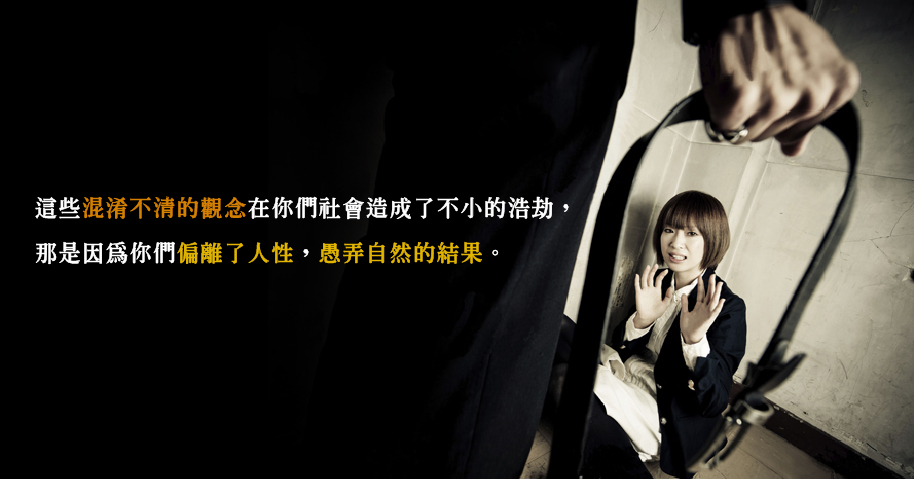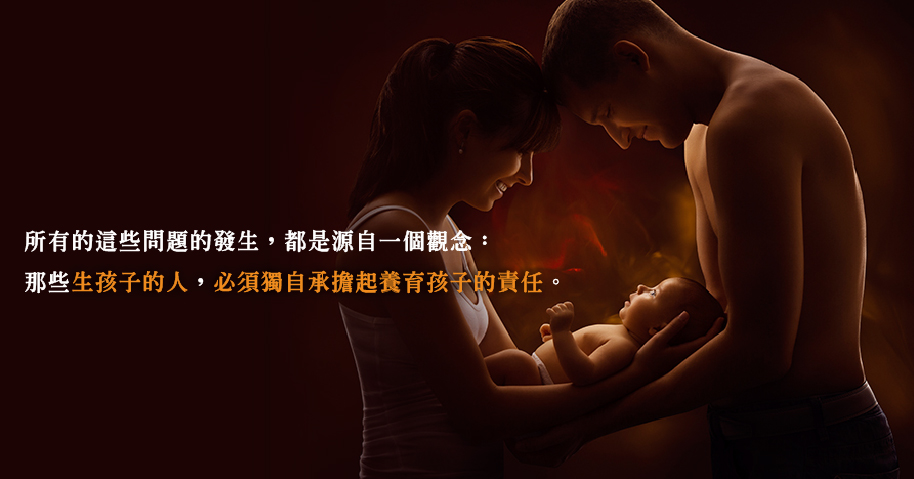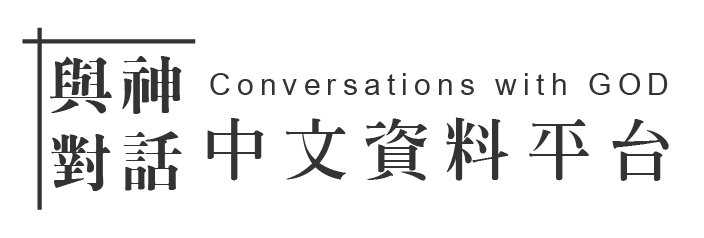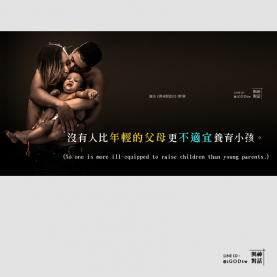續相關文章中的那篇正視【社會裡「年輕的父母養育小孩」有何不妥?】的對話內容,此篇的標題是一個我們若要加速邁向真正和諧喜悅的社會,遲早必須面對的「新觀念」。讓我們來宏觀地檢視,探究這段珍貴對話信息所談的觀念到底對不對、道理為何?

【「生孩子,就必須負責養育」的觀念,有何不對?】
生孩子的事本應由年輕人去做,而養育孩子的事本應由年長的人去做,因為他們的心智已發展好且強大。但在你們的社會,你們卻堅持生孩子的人必須負責養育孩子——結果是,你們不但使得做父母的育兒工作十分艱困,也把許多環繞著性行為(sexual act)的能量給扭曲了...
大人們發明了各種家庭的、文化的、宗教的、社會的和經濟壓力的約束和限制,以合理化他們讓自己對孩子的要求。孩子們也因此漸漸長大而接受他們「自己的性是不自然的」觀念。但任何「自然」的事,怎麼會這麼被羞恥、被制止、被控制、被否定呢?
尼爾:嘿,我想你說的有點誇張。你不覺得你有點誇張嗎?
真的嗎?對一個四、五歲孩子身上的某一部分,做父母的甚至連正確的名稱都不肯使用,你想這對孩子會有什麼樣的衝擊?你們如何告訴孩子你們身體這一部分的舒服程度?而你認為他們這一部分的舒服程度又該如何表達?
尼爾:呃……
是啊,就只能「呃……」
尼爾:啊,就像我祖母常說的:「我們是不用那些字眼的。我們只說「噓噓」或「屁屁」,聽起比較好。
你們在一般的談話中幾乎不用這些身體部位的真實名稱,只因為你們對這些名稱添加了太多負面標籤的「包袱」。
孩子們在年幼的時候,當然不懂父母為什麼會覺得這樣,只是留下了印象,留下時常難以去除的印象,認為身體的某些部分是「不可碰、不可說」的,凡是與那部分有關的就會讓人尷尬——如果不是說那是「不對」的話。

等孩子們長到十幾歲的時候,他們可能會醒悟,發現事實並非如此,但那時你們又會以非常清楚的言詞告訴他們,性生活會讓人懷孕,他們必須如何負起養育孩子的責任。也就因此,他們又有了另一個會覺得性是「不對」的理由——觀念就這樣在(惡性)循環。
這在你們社會所造成的,不只是混淆不清的觀念,而是一個不小的浩劫——那永遠是愚弄自然(fooling around with nature)的結果。
你們已創造出對性的尷尬、對性的壓抑、對性的羞恥感——因而導致你們對性的禁忌、失調和暴力。
就一個社會而言,凡是你們覺得尷尬的,總是會被禁止;凡是被壓抑的,總會在行為上失調;而凡是內心明明覺得不該羞愧的事,卻必須感到羞愧的,總會引發暴力行為來抗議。
尼爾:那麼,佛洛伊德說,人類的憤怒跟性有很大的關連——內心深處必須壓抑某些基本和自然的生理本能、興趣與渴望。

你們許多的精神病學家都曾提出這樣的說法。人會憤怒是因為他明明知道某件他覺得非常好而不該感到羞恥的事,卻確實被感到羞恥與罪惡。
首先,人會對於「明顯應該被認為那麼壞」的事「感覺這麼好」,而跟自己生氣。
然後,當他們終於明白他們一直被愚弄了——原來性是人的經驗中美妙的、可敬重珍惜的、極其愉快的部分——他們開始對別人憤怒:憤怒父母對他們的壓抑、憤怒宗教對他們的羞辱、憤怒異性對他們的挑釁、憤怒整個社會對他們的控制。
最後,他們變得「因為自己讓所有這些人與事來禁止他們」,對自己懊悔生氣。

大部分這些被壓抑的憤怒,已導入「你們現居社會被扭曲和誤導的道德價值」的建構——一個用紀念碑、雕像、郵票、電影、圖書、攝影和電視節目,在美化和推崇世界上最醜陋的暴力行為,卻隱藏,或更糟的賤低,一些世間最美麗的愛之行為的社會。
而全部的這些——所有的這些——問題的發生,都是源自一個觀念:那些生孩子的人,必須獨自承擔起養育孩子的責任。
摘自《與神對話III》第1章


Child bearing was meant to be an activity of the young, whose bodies are well developed and strong. Child raising was meant to be an activity of the elders, whose minds are well developed and strong. In your society you have insisted on making child- bearers responsible for child raising—with the result that you've made not only the process of parenting very difficult, but distorted many of the energies surrounding the sexual act as well as.
So adults have invented all manner of familial, cultural, religious, social, and economic pressures, restrictions, and limitations to justify their unnatural demands of their offspring. Children have thus grown to accept that their own sexuality is unnatural.How can anything that is "natural" be so shamed, so always-stopped, so controlled, held at bay, restrained, bridled, and denied?
Neale: Well, I think You're exaggerating a bit here. Don't You think You're exaggerating?
Really? What do you think is the impact on a four- or five-year-old child when parents won't even use the correct name for certain of their body parts? What are you telling the child about your level of comfort with that, and what you think theirs should be?
Neale: Uh...
Yes ... "uh ..." indeed.
Neale: Well, "we just don't use those words," as my grammy used to say. It's just that "wee-wee" and "your bottom" sounds better.
Only because you have so much negative "baggage" attached to the actual names of these body parts that you can barely use the words in ordinary conversation.
At the youngest ages, of course, children don't know why parents feel this way, but merely are left with the impression, the often indelible impression, that certain body parts are "not okay," and that anything having to do with them is embarrassing—if not "wrong.
As children grow older and move into their teens, they may come to realize that this is not true, but then they are told in very clear terms about the connection between pregnancy and sexuality, and about how they will have to raise the children they create, and so they now have another reason for feeling that sexual expression is "wrong"—and the circle is complete.
What this has caused in your society is confusion and not a little havoc— which is always the result of fooling around with nature.
You have created sexual embarrassment, repression, and shame—which has led to sexual inhibition, dysfunction, and violence.
You will, as a society, always be inhibited about that over which you are embarrassed; always be dysfunctional with behaviors which have been repressed, and always act out violently in protest of being made to feel shame about that over which you know in your heart you should never have felt shame at all.
Neale: Then Freud was on to something when he said that a huge amount of the anger in the human species might be sexually related—deep-seated rage over having to repress basic and natural physical instincts, interests, and urges.
More than one of your psychiatrists has ventured as much. The human being is angry because it knows it should feel no shame over something that feels so good— and yet it does feel shame, and guilt.
First, the human becomes angry with the Self for feeling so good about something which is supposed to be so obviously "bad."
Then, when they finally realize they've been duped—that sexuality is supposed to be a wonderful, honorable, glorious part of the human experience—they become angry with others: parents, for repressing them, religion for shaming them, members of the opposite sex for daring them, the whole society for controlling them.
Finally, they become angry with themselves, for allowing all of this to inhibit them.
Much of this repressed anger has been channeled into the construction of distorted and misguided moral values in the society in which you now live—a society which glorifies and honors, with monuments, statues, and commemorative stamps, films, pictures, and TV programs, some of the world's ugliest acts of violence, but hides— or worse yet, cheapens—some of the world's most beautiful acts of love.
And all of this—all of this—has emerged from a single thought: that those who bear children, bear also the sole responsibility for raising them.










